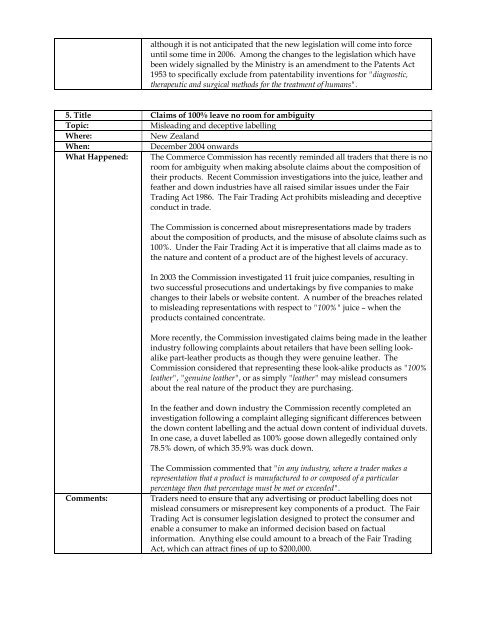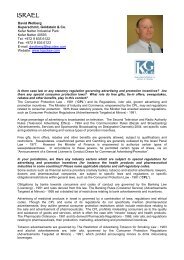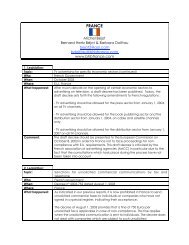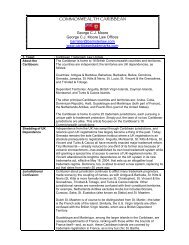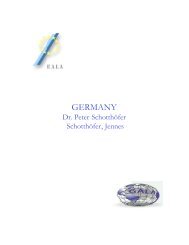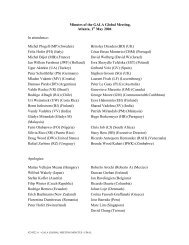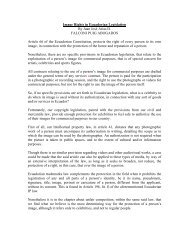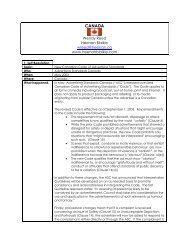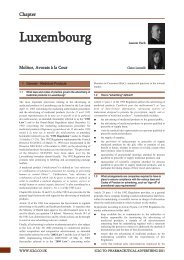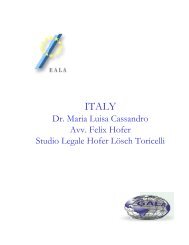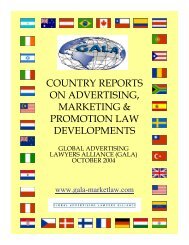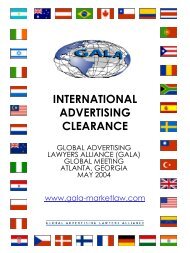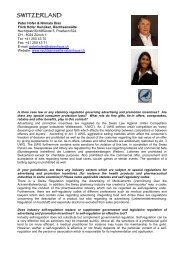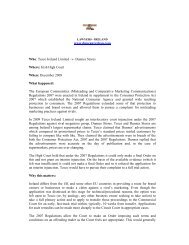list of contributors - GALA
list of contributors - GALA
list of contributors - GALA
Create successful ePaper yourself
Turn your PDF publications into a flip-book with our unique Google optimized e-Paper software.
although it is not anticipated that the new legislation will come into force<br />
until some time in 2006. Among the changes to the legislation which have<br />
been widely signalled by the Ministry is an amendment to the Patents Act<br />
1953 to specifically exclude from patentability inventions for "diagnostic,<br />
therapeutic and surgical methods for the treatment <strong>of</strong> humans".<br />
5. Title Claims <strong>of</strong> 100% leave no room for ambiguity<br />
Topic: Misleading and deceptive labelling<br />
Where: New Zealand<br />
When: December 2004 onwards<br />
What Happened: The Commerce Commission has recently reminded all traders that there is no<br />
room for ambiguity when making absolute claims about the composition <strong>of</strong><br />
their products. Recent Commission investigations into the juice, leather and<br />
feather and down industries have all raised similar issues under the Fair<br />
Trading Act 1986. The Fair Trading Act prohibits misleading and deceptive<br />
conduct in trade.<br />
The Commission is concerned about misrepresentations made by traders<br />
about the composition <strong>of</strong> products, and the misuse <strong>of</strong> absolute claims such as<br />
100%. Under the Fair Trading Act it is imperative that all claims made as to<br />
the nature and content <strong>of</strong> a product are <strong>of</strong> the highest levels <strong>of</strong> accuracy.<br />
In 2003 the Commission investigated 11 fruit juice companies, resulting in<br />
two successful prosecutions and undertakings by five companies to make<br />
changes to their labels or website content. A number <strong>of</strong> the breaches related<br />
to misleading representations with respect to "100%" juice – when the<br />
products contained concentrate.<br />
More recently, the Commission investigated claims being made in the leather<br />
industry following complaints about retailers that have been selling lookalike<br />
part-leather products as though they were genuine leather. The<br />
Commission considered that representing these look-alike products as "100%<br />
leather", "genuine leather", or as simply "leather" may mislead consumers<br />
about the real nature <strong>of</strong> the product they are purchasing.<br />
In the feather and down industry the Commission recently completed an<br />
investigation following a complaint alleging significant differences between<br />
the down content labelling and the actual down content <strong>of</strong> individual duvets.<br />
In one case, a duvet labelled as 100% goose down allegedly contained only<br />
78.5% down, <strong>of</strong> which 35.9% was duck down.<br />
The Commission commented that "in any industry, where a trader makes a<br />
representation that a product is manufactured to or composed <strong>of</strong> a particular<br />
percentage then that percentage must be met or exceeded".<br />
Comments: Traders need to ensure that any advertising or product labelling does not<br />
mislead consumers or misrepresent key components <strong>of</strong> a product. The Fair<br />
Trading Act is consumer legislation designed to protect the consumer and<br />
enable a consumer to make an informed decision based on factual<br />
information. Anything else could amount to a breach <strong>of</strong> the Fair Trading<br />
Act, which can attract fines <strong>of</strong> up to $200,000.


